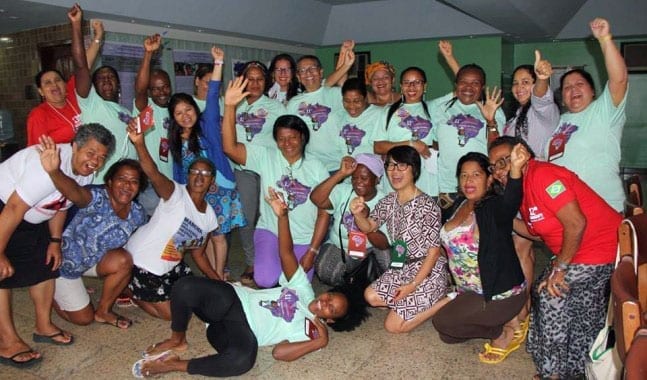Following years of campaigning by domestic workers and their allies across Brazil, the government in recent days ratified the International Labor Organization Domestic Workers Convention (No. 189), a binding standard in which domestic workers are entitled to full labor rights, including those covering work hours, overtime pay, safety and health standards and paid leave. Brazil is the twenty-fifth country to ratify Convention 189 and the fourteenth in the Americas region.
Since the ILO passed the convention in 2011, the National Federation of Domestic Workers (FENATRAD), the National Confederation of Retail and Service Workers (CONTRACS) and the Central Union of Workers (CUT) were among unions pushing for its ratification, ultimately securing 1.2 million signatures urging the government to ratify the measure.
In a statement celebrating ratification, FENATRAD also vows to continue in the “daily struggle for dignity, valorization and recognition of domestic work, work that moves and creates conditions for other workers to dedicate themselves to productive activities.”
Brazil Economy Slumps as Labor Rights Attacked
The majority of the 7 million domestic workers in Brazil are women, primarily indigenous people and Afro-Brazilians. Brazil’s slumping economy has seen a sharp increase of workers in the informal-sector jobs, with 121,000 domestic worker jobs created between December 2014 and April 2017. At the same time, more than 3.2 million jobs were lost in the formal private sector and some 600,000 jobs lost in the public sector, according to the Department of Statistics and Socioeconomic Studies in Brazil (DIEESE).
Further, more than 9 million people have been pushed below the poverty line since 2015 and 800,000 Brazilians entered the ranks of the unemployed between January and August 2017.
Although workers are celebrating passage of the Domestic Workers Convention, they say a labor reform law passed last year severely weakens their fundamental rights on the job. The law in part dismantles provisions on overtime pay and working hours; creates new forms of precarious contracting, such as “zero-hour” contracts that do not guarantee a minimum wage; and permits pregnant women and breastfeeding mothers to work in unhealthy environments.
The law also disproportionately impacts historically disadvantaged workers, such as women and Afro-Brazilians, who earn less and are much more likely to be unemployed or underemployed than their white male counterparts.
“The convention is to guarantee decent work, unlike the new law that removes basic rights of the worker and the worker,” says Myllena Calazans, a lawyer with FENATRAD.
With Solidarity Center support, FENATRAD recently registered as a national federation, became a member of the International Domestic Workers Federation (IDWF) and is connecting with regional domestic worker organizations.
The Solidarity Center is also assisting the federation in education and outreach, including creation of a crossword puzzle magazine that informs Brazilian domestic workers about their rights. Many domestic workers spend numerous hours on public transportation commuting to and from work and do crossword puzzles during their commutes.

